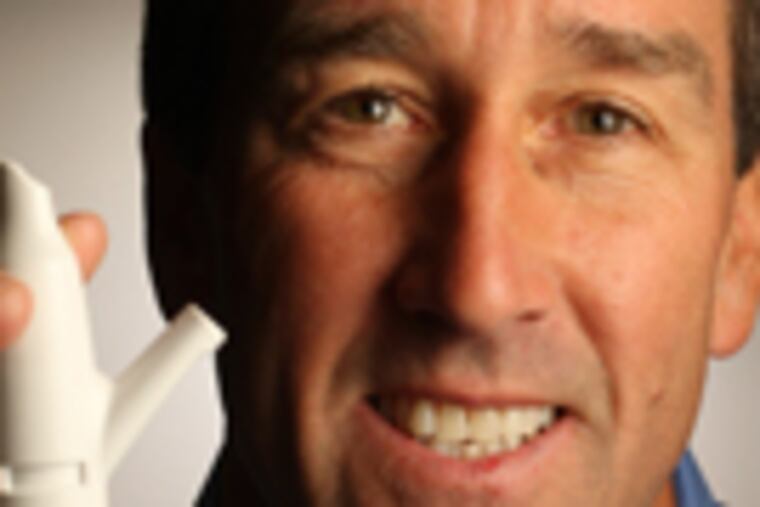Yardley start-up hoping medical device delivers
Peter Miller and Ramy A. Mahmoud have a shared definition of brilliant: an idea so "blindly simple" that, as Mahmoud puts it, one wonders why no one had thought of it before.

Peter Miller and Ramy A. Mahmoud have a shared definition of brilliant: an idea so "blindly simple" that, as Mahmoud puts it, one wonders why no one had thought of it before.
Both readily hang the tag on a small plastic contraption that they say will revolutionize how a wide swath of medications are delivered to patients.
A nasal-spray dispenser powered by the user's own breath, the device has the potential, its backers boast, of improving drug effectiveness, reducing dosages, and even ending injection of vaccines.
And, for investors, earning billions in sales.
Miller said he believed enough in this creation of a Norwegian ear, nose, and throat specialist that he walked away from the company he cofounded - Take Care Health Systems L.L.C. - to become chief executive officer of OptiNose US Inc., a Yardley start-up that hopes to manufacture and sell the device once it has Food and Drug Administration approval.
Taken as well by the apparatus was Mahmoud, a physician who jumped from his job as chief medical officer for Ethicon Inc., a subsidiary of Johnson & Johnson, to become OptiNose's chief operating officer.
"We have a device that takes good drugs and enables them to be delivered into the body in a way that makes them not just a little better, but substantially better," Miller said recently. "This has the potential to disrupt and transform the way pharmaceuticals are developed and commercialized."
Avista Capital Partners L.P., a New York investment firm, has enough faith in the idea that it wagered $48.9 million in June on OptiNose. The money represents about 5 percent of the average cost of developing a new drug, according to Mahmoud. In this instance, Miller said, OptiNose's spray-delivery system, using existing drugs, could have the effect of a new pharmaceutical at a fraction of the cost.
"We want to create value that is sustainable, that is real, for patients, for doctors, for health-care payers," he said. "We think this can do that."
The object of Miller's enthusiasm is a rather straightforward product not much bigger than a hummingbird. Imagine a spray dispenser with a small spout to blow through while a nosepiece is pressed into a nostril.
Blowing air through the mouth triggers the automatic closing of the airway that connects the nasal passages to the lungs and throat, Mahmoud said.
With the nasal passages sealed, spray material is more effectively dispersed throughout the nasal cavity, a large hollow behind the nose lined with membranes that can quickly absorb and move drugs into the blood, he said.
In the case of a typical spray dispenser, much of a drug dose is lost to the throat and stomach, where its effects are delayed or even undermined by the digestive process, Mahmoud said.
OptiNose's initial clinical trials have shown the device can more effectively deliver painkillers for migraines, and steroids to treat nasal polyps.
"I'm very excited about it," said James Palmer, director of rhinology at the Hospital of the University of Pennsylvania, who treats patients with nasal polyps. "It takes the same dosage of steroids we have been using for years and know are safe clinically but don't work as well as we like and puts those steroids really where we want them to go, so you can take the same doses and get a better effect."
Palmer has been advising the firm and is considering a formal consulting arrangement with the firm, Frank Closurdo, OptiNose's chief marketing officer, said.
Beyond polyps and migraines, the device could provide a boost for any number of drugs that could be more effective or convenient entering the body by way of the nasal membranes.
Vaccines are an example, Mahmoud said. Typically large, complex molecules, many vaccines are broken down and destroyed if they enter the body through the stomach. They must be injected intravenously.
If vaccines can be safely and efficiently delivered by nasal spray, patients could vaccinate themselves, reducing costs and the medical waste that comes with using needles, Mahmoud said.
OptiNose is now conducting clinical trials to win FDA approval to use the device to deliver fluticasone, a steroid used to treat polyps, and sumatriptan, a migraine medication.
The company, recently moved from Norway, has all of 14 employees as it builds the infrastructure it needs to support the future Miller envisions.
"We plan to be on the market in three to four years," he said. "These two products [fluticasone and sumatriptan] alone have the sales potential of $300 [million] to $400 million. I see us as eventually being a specialty-pharmaceutical company with 500 to 1,000 employees."
Which he and Mahmoud agreed would be brilliant.